Price Graphic Arts & Communications | home
George Armstrong Custer
Little Bighorn Battlefield 2004
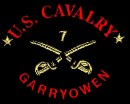 George Armstrong Custer 1868
George Armstrong Custer 1868 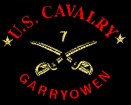
Oil on Canvas 16"x20"
Painting by Bob Price
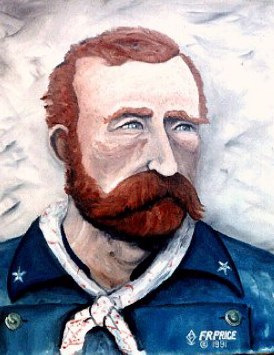
Lt. Col. George Armstrong Custer
As he appeared at the Battle of the Washita in November 1868
"The Provost must have a horse allowed him and some soldiers to attend him, and all the rest commanded to obey and assist or else the service will suffer, for he is but one man and must correct many and therefore he can not be beloved, And he must be riding from one garrison to another to see the soldiers do no outrage and not scathe the country." - King Charles I, circa 1650

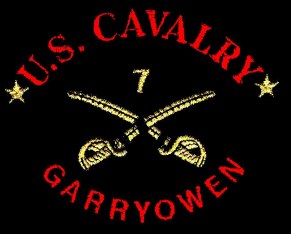
A Galvanized Texas Trooper portrayed by Bob Price
Price Prepares for a Living History Talk
(During the Civil War; Captured Confederate Troopers were offered Pardons if they would fight against the Indians in the West
guaranteed that they would never raise hostile arms against Confederate forces...they were called 'Galvanized Yankees')
Bob Price...speaking on The Custer Myth
"...When the legends failed America, it was time to expose the facts; and once the public had a taste of honesty...thru modern historical research; then the quest for Custer and his Myth has never ceased; and though there will never be total agreement on Custer and his actions; one thing is perfectly clear...which is this; the Truth lies somewhere between the myth, the man, the legend and Custer's unequaled record as a Union officer in America's second rebellion...
...That Custer was rash...there is no question...that he was needed there is no doubt...that no one else in his time period could be depended upon to attempt warfare against man and nature as could he...was the decision of his superiors Sherman and Sheridan...They created the man who became the myth...and in his death...themselves received welcome pardon for their guilt in his creation...
...Dee Brown; the Native American Author...almost hit the nail on the head when Brown published his very well received book...Custer Died for your Sins...
...however; Custer more pointedly died for the sins of an inadequate Indian Policy; and the failures of Politicians and Military Officials who carried out an impossible negotiation process; and came up with ideas of co-existance and mututal respect that was impossible to enforce from either the Indian standpoint or the governments...
...For better or worse; these men carried out the goals and policies dictated by our Federalist Government...which just happened to be the duty of all good soldiers under the Union Flag...
...Custer was NEVER considered by himself or his peers as a 'Great Indian Fighter'; he was however as popular with the public then as famous people are today; and there was just as much contradictory information about him as one could find about any celebrity in our modern tabloids...Ronald McKenzie was considered a much more celebrated Indian Fighter amoung his peers; and had he died at the head of his command instead of dying from the ills of a venereal disease; then there would probably some competition for the historic imagination...
...For the most part the Indians did not even know that Custer existed...but; movies, books and tall tales have made the name Custer synonymous with 'The Greatest Indian Fighter ever'...he was alot of things to different people...but, the record is clear...this was not one of them...Custer the man was the creation of the military...
...Custer the Myth was the creation of the collective public mind and the news media of the day...
...Custer filled the void following the Civil War when the pomp and ceremony died...
...America longed for its military heros...it had been accustomed to being entertained by the American Versions of 'The Charge of the Light Brigade' in the newspapers...
...Glory on the Home Front was soon reduced to men without arms and legs and long winded stories of terrible battles...Custer in a sense was still at the front...though the front had moved West where the public hope and imagination of 'real' Glory lived...
...And Custer by writing his own history in the press...was his own best and worst publicity man...
...He was loved and hated, admired, despised, idolized and worshipped for his record during the Civil War. No one's record exceeded his. No one General caught the imagination of the patriotic citizen or the youth in those days as did Custer...for those who did not live in the West; Custer was imagined as a hero taking on the last American frontier and its native warriors...Custer the Conqueror...Custer the Great...and Custer himself knew better than that...
...In the west Custer was just as well remembered as the officer who flogged his own troopers when they tried to desert when the unit was transferred to Texas...though, flogging and the tying of soldiers to wagon wheels was illegal, he dug holes in the ground to stockade his prisoners, he shaved their heads in disciplinary actions and had them 'drummed' around the parade ground. When his men had scant food; Custer was well provisioned and provided himself with a black servant and cook who prepared his meals; he filled his officers staff with relatives; and hosted dignitaries on wild animal hunts while settlers cowered in their dugouts awaiting the tomahawk or the knife...he courted his wife openly when he lead a horde of lonely men...
...When in later years men started to desert the Cavalry in broad daylight he ordered them rounded up and some were even shot and killed on site. He was immovable in his disipline of others though Custer himself was court-martialed for deserting his post and abandoning soldiers who could not keep up on a forced march; a march Custer invents just so he could go see his wife...
...Custer was an American creation...
...The blood stains of Custer's action belong to us as a nation and a people...and should not be placed on those whose records none of us could match or surpass ourselves. For us to do otherwise ignores the responsibility we all share...we created the Generals who made the wars...it is no wonder that they created men like Custer who would carry out their orders without question...
...When those in power become all powerful...Humainity suffers most next to Freedom and Dignity...
...Custer adopted many of his principals of warfare from experience...if it worked once then like as not he was likely to try it again...he had good instructors as well...
...During the Civil War...Sheridan and Sherman both considered civilians and their homes as legitimate targets of war and retribution...
...The Union Burned Atlanta and marched to the sea...and put military thinking back on the same level it had achieved in The Dark Ages; without reflection of Moral or Christian Ethics or concerns for Honor or the Sanctity of Human Life. Everyone and everything became a target; by necessity it is argued; after years of open and un-negotiated warfare...Actions which they deemed necessary in being Swift, Indiscriminate and Decisive in Victory...
...Custer was there among those in power and helped lead the way...
...Custer; in fact; was Sherman and Sheridan's first American student of this idea of total warfare in modern times; and he was taught his craft very well during and after the Civil War...when you view his actions during that time you come away with a different view of the 'real Custer'...
...His guilt may be that he was human...and his crime is the crime of allegiance to duty...
...Custer was ordered to fire the homes and burn down Southern residences in the Shenandoah Valley...which he carried out...this was an action taken against white people in the South and not the Indian Nations or the Red Man...When the Rebels killed Union troops billeted in Southern Homes; Custer captured some Confederate troops and unceremoniously hung them in retaliation...
...After the Civil War his unit was the first to be called on to put down the rebellions started by an active Ku Klux Klan in the former Confederacy; and when his unit was not deactivated and sent home as were most others and he and his men were sent west; he embraced the black man so openly as to be well hated by the conservative factions of Texas during his days as Military Governor of the Lone Star State; (see John Carroll's book Custer in Texas)...
...And during his 'Indian Campaigns' he wrote glowing praise of his Native American enemy in his newspaper columns...But, Custer's respect for his enemy was never a substitute for his military mission and his commander's desire for a decisive victory...
...In 1868 following an outbreak of the Southern Cheyennes, Kiowas and Arapahoes along the Smokey Hill Route of Kansas and in Eastern Colorado; Custer and his elite 7th Cavalry was ordered into the field in the dead of winter...
...That Custer attacked the Washita Valley and burned Black Kettle's Cheyenne Village to the ground and killed hundreds of horses to keep them from the hands of the enemy is expected; that his command was under orders to capture all women and children and kill or hang all men and boys above the age of twelve (which is the age a boy becomes a warrior) is of little wonder, especially when it is known that Sherman and Sheridan ordered the action...women and children were killed in the melee and this was considered an acceptable cost by Custer's superiors until the story hit the Eastern Press; that parts of this action runs afoul of our Civilian Code of Moral ethics or Christian ideals is expected; as these morals, ethics, and ideals were not used as the corner stones of planning when the Winter War of 1868 was hatched...and hatched not by Custer; but, by Sheridan and Sherman while Custer was back East relieved of command because of his Court Martial...Custer was only brought West into the frey when no one else was thought capable of performing the impossible...an giving and receiving 'No Quarter' when required...a man ahead of his command and not following behind in a wagon as did his predecessor in the Western Theatre...
...Therefore; I contend that...Custer's motives were not the actions of a mad man or a fool or a racist; but were the actions of a dutiful soldier, sometimes errant in his personal life and too rash in his quick decisions; blind in his duty as a soldier trained at West Point who carried out his legal orders regardless of the cannons of mankind and humanity; actions embracing total warfare which he was taught against his own race; when patience, negotiation, and available technology was exhausted in trying to achieve peaceful solutions by his superiors...

Washita Valley near Cheyenne Oklahoma (National Park Service Photo)
...These ideas of total warfare were familiar ideas quickly embraced by Generals Sheridan and Sherman who helped to create the atmosphere of total war during the late Rebellion; a total warfare concept which eventually was waged against the Native Americans and an idea of total warfare we have willingly carried onto the battlefields of the 20th and 21st Century...
...Sadly...the world has changed little since Custer's day...
...Not only does modern man desire swift and decisive victory with indiscriminate weapons; but we demand it...War is still Hell...and Peaceful Negotiation and Patience the better Virtues...which must be sought brother to brother; and country to country...lest we repeat the need to wage war...but should war come we are well schooled in our trade as military men and while we have no Custer's or Sheridans or Shermans in our army we do have men still willing to play the necessary role to achieve victory...let us hope that we have adopted the cannons of mankind and humanity in our planning should we ever depart from Peace again; as humane action for the sake of humanity is still the higher calling...and goes hand to hand in support of the Golden Rule we all should live by...
...We should be aware that a little bit of the 'Custer' is in us all and that knowledge should humble us in our dealings with our fellow man...in war and in peace...
- Bob Price 1992; Cheyenne Oklahoma
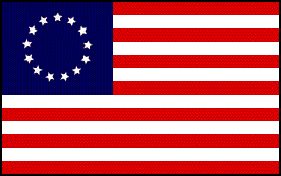
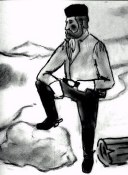
Custer at the Washita
(very early charcoal about 1968 - Bob Price)
The Battle of the Washita is still controversial. As Native American Indians attempt to have the Site of the Battle of the Washita Declared America's First 'Massacre Site'. Not only is this wrong; but it can not be proved by the evidence.
Part of the Response to the National Park Service
by Bob Price
"The Indians violated the Treaty of 1868; raided murdered and kidnapped women and children throughout Kansas and Colorado; were declared as out-of-bounds by the Government at Ft. Cobb; and were notified that if they did not return to their reservation boundary they would be considered hostile forces and would face the wrath of the US Government.
Instead these tribes remained on the hunting grounds and launched war parties and continued to hold captives making no attempt to return those captives or to travel to their reservation boundary.
The 7th US Cavalry launched a preemptive strike to stop future hostilities in the area by tribes of the Southern Cheyennes, Arapahoes and the Kiowas. At the request of Congress and the General Staff the US Army was tasked to maintain peace in the area. And to attack and destroy all hostile tribes outside their reservation boundries.
These Indian Tribes and these villages which were eventually attacked had been pointed out by name during Congressional testimony as to the felons who committed specific acts of Terrorism.
Those leaders and their tribes were duly notified of their 'outlaw status' by the Government Agents at Fort Cobb. They were given a set of demands that they return to their reservation area as that was the only place they could be protected.
The actions of these specific tribes and their leadership brought about the end result; of an attack on the Villages located along the Washita in 1868.
The attack was a surprise engagement in order to achieve success and in order to engage the enemy who would not stand and fight.
This was not a massacre; but a duly authorized engagement with rules imposed and complied with as to the care and security of women and children prisoners. That noncombatants were killed in the action is no surprise. The trail which lead the Cavalry to the villages was a returning War Party; distinguished from a hunting party by the fact that there were no travois, nor dogs nor women and children to cut and preserve the meat stores.
That trail led directly to Black Kettle's Cheyenne Camp (previously named in Congressional Testimony as one of the bands whose members had previously participated in war parties against settlers along the Smokey Hill Route and in Southern Colorado).
These raiding parties acted as partisan guerilla units in hit and strike tactics against non-combatant civilians and civilian settlements.
Since the Indians would not meet the Cavalry on the field of combat; but rather; resorted to guerilla warfare and clandestine tactics against settlers and women and children. The US Government was given no choice but to take the warfare to the Indians. As negotiations had not worked. Given the circumstances of combat; the fact that any survivors remained in Black Kettle's village was a miracle and a direct result of Custer himself issuing orders to protect women and children survivors.
When notified by one of his staff officers that the Tonkawa Scouts (Indians) were pursuing and killing the fleeing women and children. Custer immediately had the Tonkawas stopped and he placed the survivors in protective custody.
The discovery of murdered captives among the Indian dead; and photographs and papers of the settlers in Kansas and Colorado was physical proof of guilt of some of the members of these tribes who were guilty of causing their own peoples to be at risk of life and property by the Army.
Harboring a felon and the holding of captives was a crime in 1868 and was against the agreement of the Medicine Lodge Treaty upon which these Indian leaders placed their mark.
Unless this carnage was to continue unchecked following the Winter of 1868;
I can see no other path for peaceful solution which could have been tried; which not already been attempted at the Medicine Lodge Treaty.
And in subsequent conversations between the Agent at Ft. Cobb and the Indian Tribes themselves;
the Indian leaders were informed of their members guilt in these actions and they did not offer to repatriate the captives nor did they come up with the guilty individuals; as prescribed by the Medicine Lodge Treaty of 1868.
And, since that carnage ceased after the Battle of the Washita; and Peace returned to the area; it can reasonably be assumed that the guilty individuals were duly punished.
That the action of some should cause the pain and suffering of the innocent is sad; but, it is one of the costs of associating with murderers, felons, kidnappers and thieves. There is no evidence that any members of this Black Kettle's tribe; nor, Black Kettle himself, made any attempt to return any captives when the opportunity presented itself before this attack at Ft. Cobb. Had they done so the results possibly could have been quite different.
It is clear; the government was given no choice but to act in a manner which placed the Army at the least amount of risk; at the same time providing the best chance for success. And the General Staff chose a time which would give the end result desired.
All attempts to negotiate with the Southern Cheyennes had failed to bring about frontier security.
While regretable in the fact that non-combatants were put in harms way; this combat along the Washita was a sound military 'First Strike' and pre-emptive punitive military action; meant to send a clear and decisive message to the tribes on the Southern Plains.
That message was; ' Stop now! Or, suffer more later...'
No action against the Indian problem was perfect and this one is no exception.
But, there is no doubt the actions at the Washita was justifiable and based on information available at the highest levels of the US government of 1868.
And there is ample evidence to indicate that resonable care was taken to protect Indian non-combatants to the extent allow by the situation itself...In modern terminology the actions at the Washita was authorized by Presidential finding; with General's Sherman and Sheridan acting within the scope of their duty and assignment."
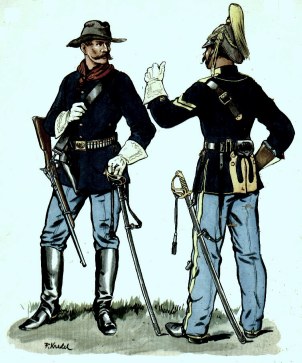
7th Cavalry 1876
Left; Trooper Field Service Uniform
Right; Corporal in Full Dress Uniform
US Army Graphic: Public Domain; G.P.O. Printing Office






Next Page